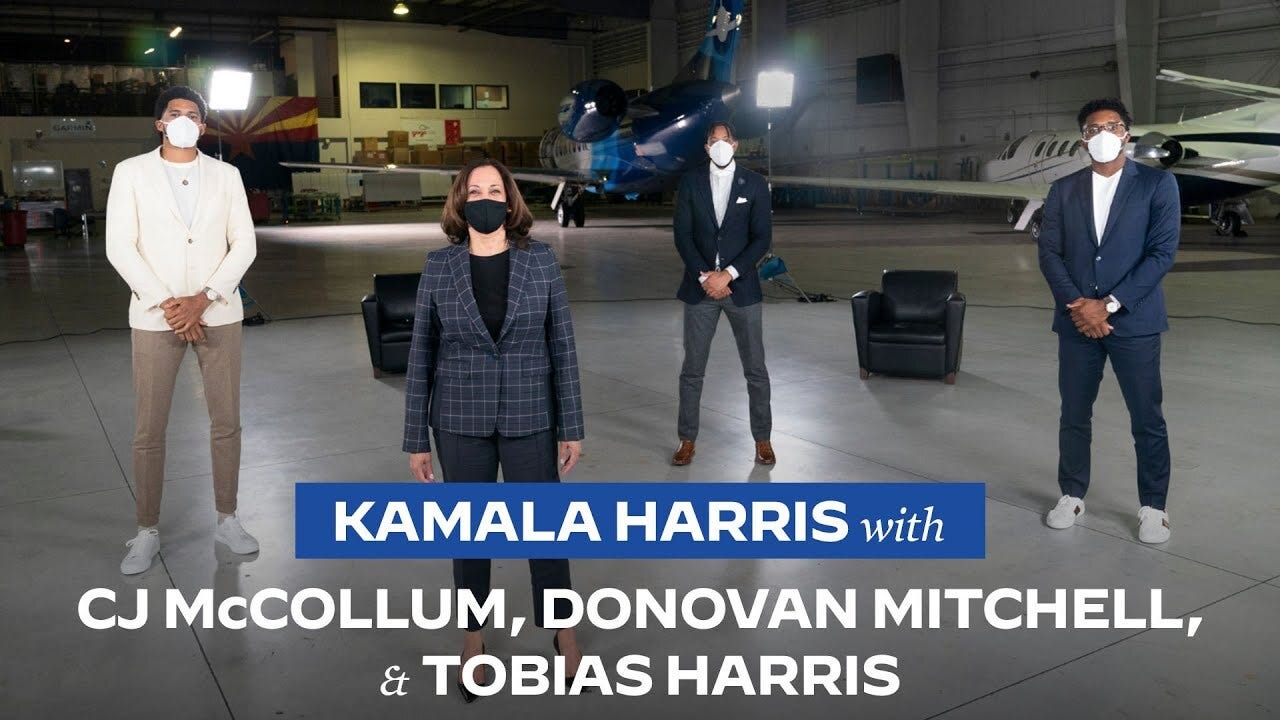Where were the athletes?
Four years ago, sports stars played an integral role in getting out the vote. This election cycle looked a whole lot different.
Welcome back to Club Sportico, where we breakdown the intersection of sports and money—with an extra bit of humor and opinion. Eben leads off this week…
In the Summer of 2020, budding NBA star Donovan Mitchell emerged as one of the league’s most vocal advocates on political and social issues. He penned a powerful essay about a personal run-in with law enforcement, helped launch the NBA’s Social Justice Coalition, and showed up to one game wearing a bulletproof vest bearing the names of Black Americans killed by police. In the run-up to Joe Biden’s election—which he celebrated loudly—he appeared in a campaign video with vice presidential hopeful Kamala Harris titled “The Power of Voting.”
Four years later, as Harris launched her 100-day sprint for the presidency, Mitchell was far less outspoken.1 And he’s not alone. The 2020 election had a groundswell of athletes marching in the streets and encouraging fans (and each other) to vote. Excluding some notable exceptions, many of those athletes were far more muted this year.
This is not a judgement of Mitchell, or any other athlete. Celebrities should feel no obligation to speak on their political beliefs. It does, however, feel notable that in a consequential presidential campaign marked by celebrity participation—Taylor Swift and Beyoncé on one side, 50 Cent and Elon Musk on the other—athletes seemed surprisingly absent from much of the discourse.
Why is that? New Orleans Pelicans guard CJ McCollum recently offered some thoughts. The 33-year-old, who appeared in that 2020 video with Mitchell and Kamala Harris and is now president of the NBA players union, acknowledged in an interview with Andscape that there was a decrease in interest from NBA players to promote voting this cycle.
The 2020 election, McCollum said, occurred during the COVID pandemic when players had fewer distractions and were more connected to the news. It also happened against the backdrop of the murders of George Floyd and Breonna Taylor at the hands of police. Those deaths spurred rallies across the country in support of racial justice, a topic with personal resonance for many pro athletes.
“In 2020, the world stopped," McCollum told Andscape. “Everyone paid attention.”
Golden State Warriors coach Steve Kerr, a former NBA player with a tragic personal connection to gun violence, weighed in as well.
“Through most of my playing career, athletes didn’t really speak out politically at all," he said. "Four years ago, was a very heated time in the country with COVID, with the George Floyd murder. I think circumstances dictate a lot of that sort of activity whether it's athletes or young people… That is kind of the history of our country. [During] Vietnam, it went way up. That was coming on the heels of the Civil Rights movement with Kareem [Abdul-Jabbar], [Muhammad] Ali and Jim Brown. Then there is a big lull. It’s kind of like everything else, it kind of comes and goes.”2
Of course there are plenty of possible explanations. One of the two presidential candidates was different, as were the main issues at stake. It also seems downright exhausting to be a public figure expressing any political or social views right now, equally true if you're Harrison Butker or Megan Rapinoe.
And while I'm personally skeptical about how much all of this actually matters--most celebrities are not particularly relatable, and their endorsements often feel inauthentic--there is mounting evidence that it does. A recent Harvard University study looked at how influencers like Kylie Jenner and David Dobrik drove voter registration in 2020, and found significant impact.
“While some polling shows that people claim they aren’t influenced by celebrity voices when it comes to politics, more rigorous evidence indicates that these voices are incredibly powerful,” the study says.
Maybe a more vocal cohort of athletes could have influenced this week’s results.3 Or maybe sports stars that lean left were expressing apathy that was reflected in the broader electorate. With votes still being counted, Harris currently has 13 million fewer votes than Biden did in 2020 and will certainly finish well below that tally.
Kerr, who voted spoke at the Democratic National Convention on Harris’ behalf, said something else this week that also resonated with me. “I kind of think there is some fatigue involved,” he said. “At some point people just want to go on with their lives and live their lives.”
tl;dr: 🙁
Want free access to the entire Club Sportico experience, including exclusive trivia contests and Monday missives? Start by referring friends!
Now turning it over to Jacob for additional thoughts on the election’s impact on sports, the Pope’s bizarre posting habits, and more for our favorite people, Club Sportico’s paid members…
Story of the Week 🎰: Among the races I was tracking Tuesday night was Missouri’s sports betting ballot initiative. It ultimately passed by a margin of a few thousand votes, 50.1% to 49.9%. Eben has the details. I’m fascinated to see how the industry ultimately reacts to such a split decision.
Story of the Week (Non-Sportico Division) 🗳️: Trump’s re-election means he will represent the country as it prepares to host the 2026 World Cup and the 2028 Los Angeles Olympics, two potential flashpoints during upcoming election years. The ’26 event is also being co-hosted by Mexico and Canada, and part of the U.S. pitch, as Adam Crafton reports here, is that Trump wouldn’t be in office by the time the tournament kicked off.
(For a non-Sportico, non-politics pick, check out this recent YouTube video on how elite athletes’ vision separates them from the competition.)
Keep reading with a 7-day free trial
Subscribe to Club Sportico to keep reading this post and get 7 days of free access to the full post archives.






